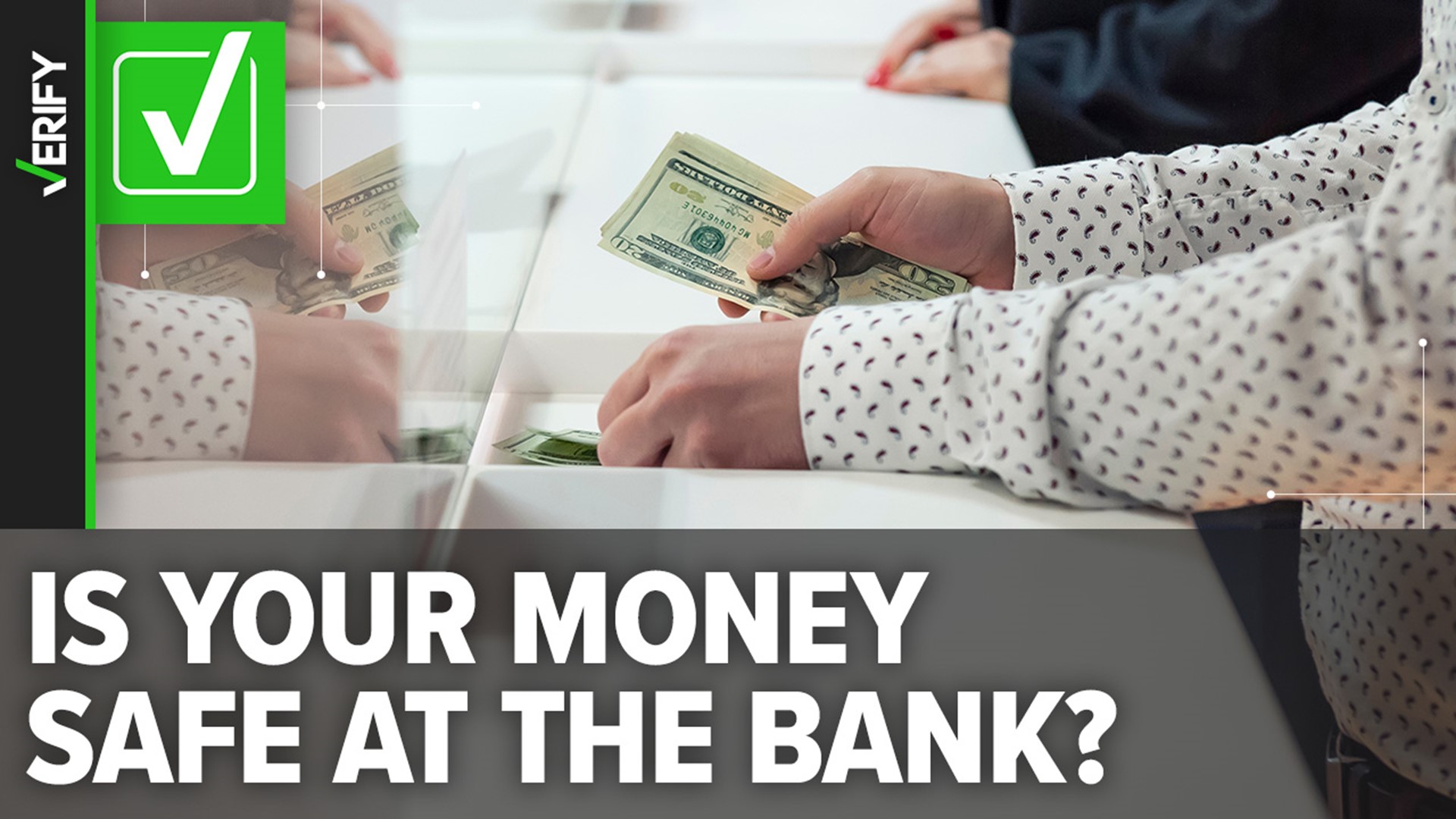Silicon Valley Bank and Signature Bank, both of which cater to the tech industry, recently collapsed after bank runs.
In the second-largest bank failure since the 2008 collapse of Washington Mutual, regulators closed Silicon Valley Bank on Friday, March 10, after many depositors rushed to withdraw their funds all at once. Two days later, regulators seized Signature Bank in the third-largest failure.
Since the collapses of both Silicon Valley and Signature Banks, online search data show many people are worried about whether their money is safe at other banks. That includes VERIFY reader Robert, who asked if his money is safe at the bank.
THE QUESTION
Is your money safe at the bank following the SVB and Signature Bank collapses?
THE SOURCES
- The Federal Deposit Insurance Corporation (FDIC)
- National Credit Union Administration (NCUA)
- Ally Bank
- David Ely, Ph.D., professor of finance at San Diego State University
- Jay Hatfield, CEO at Infrastructure Capital Advisors and portfolio manager of the InfraCap Equity Income ETF
THE ANSWER
Yes, your money is safe at the bank, if you have up to $250,000 in each bank account.
If you have up to $250,000 per account, that money is insured by the FDIC. Anything over that is not insured in the unlikely event of a bank collapse, but there are ways to make sure your money is still protected.
WHAT WE FOUND
People with money at other banks “have little reason to be concerned over the collapse of Silicon Valley Bank and Signature Bank,” David Ely, a professor of finance at San Diego State University, told VERIFY.
Most banks pay for insurance through the Federal Deposit Insurance Corporation (FDIC). People who want to check if their bank is insured can use the FDIC’s BankFind tool.
In the unlikely event of a bank failure, this insurance covers up to $250,000 per depositor, per bank, for each ownership category (meaning each account). For couples with a joint account, that amount increases to $500,000, Ally Bank explains.
Checking and savings accounts, money market accounts, certificates of deposit (CDs), cashier’s checks and money orders, and negotiable order of withdrawal (NOW) accounts are all covered by the FDIC deposit insurance.
If your account balance is less than $250,000, or less than $500,000 for a joint account, you have nothing to worry about and your money is automatically insured.
All members of federally insured credit unions also have up to $250,000 in coverage for single ownership accounts, the National Credit Union Administration (NCUA) says.
If someone has funds in different ownership categories, they may also be insured for more than $250,000, Ely said. The FDIC has an online tool to estimate insurance coverage. A similar online tool is available for credit unions.
While there was initially some confusion over what might happen to uninsured customers at SVB and Signature Bank, the federal government confirmed that they would have access to all their money starting Monday, March 13.
But there is no guarantee this will happen if another bank collapses, Jay Hatfield, CEO and portfolio manager at Infrastructure Capital Advisors, said.
So what should you do if you have over $250,000 in deposits in one bank account? There are several options.
Hatfield said people should consider moving the excess money to another bank. Ely also recommends talking with staff at your current bank about ways to shift your money into different types of accounts, since each one is insured for up to $250,000.
What went wrong at Silicon Valley and Signature Banks
Most of SVB and Signature Bank customers’ deposits were not insured, according to Ely.
“A very high percentage of uninsured deposits is not typical at major banks,” he said.
Both Silicon Valley and Signature Banks also had “narrow customer bases.” SVB served many start-up companies, while many of the customers at Signature Bank were cryptocurrency firms, Ely explained.
“As these sectors struggled, deposits held at SVB and Signature Bank declined,” Ely said. “Major banks generally serve individuals and organizations operating in multiple sectors and regions and are not overly impacted by the decline in one sector.”
The high number of uninsured deposits and, in the case of Signature Bank, exposure to cryptocurrency, made both banks “more vulnerable to bank runs,” Jay Hatfield, CEO at Infrastructure Capital Advisors, said. Bank runs occur when large numbers of customers withdraw their money from a bank at the same time, typically over fears that the bank might fail.
The Associated Press contributed to this report.
https://www.youtube.com/watch?v=0tjPeCvC-oA

